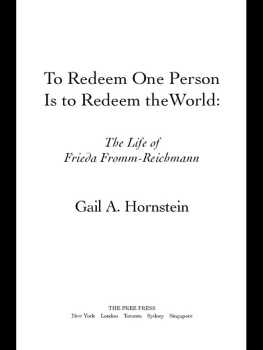PRINCIPLES
OF
INTENSIVE
PSYCHOTHERAPY
By Frieda Fromm-Reichmann, M.D.
PREFACE
THIS book on principles of intensive psychotherapy represents an elaboration on a lecture course on the same topic which I presented to students of the Washington School of Psychiatry, the Washington-Baltimore Psychoanalytic Institute in Washington, and the William Alanson White Institute of Psychiatry in New York. The audiences were composed of psychoanalysts and psychiatrists in psychoanalytic training and other professional people engaged in psychiatric or psychological research and in practical professional work, which presupposes an interest and requires skill and knowledge in handling human relations.
It is upon the request of many of these students and following an invitation extended by the University of Chicago Press that these lectures have been prepared for publication. In its outline of the philosophy of the interpersonal principles involved, the book addresses itself, first, to psychoanalytically interested psychiatrists and to young psychoanalysts and, second, to serious students of living, such as were the members of the groups that attended the lectures for the purpose of increasing their skill in conducting interviews, in remedial work, and in interpersonal guidance.
It must be stated, though, that merely reading the book does not constitute a preparation for the practical application of the psychoanalytic principles outlined. Qualification for using them for therapeutic purposes must be obtained by special training in postgraduate psychiatric and psychoanalytic schools. Throughout the book, reference will be made to the nature of these indispensable training requirements.
In addition to the four great teachers to whom this book is dedicated, I wish to express my gratitude, above all, to my colleagues of the medical staff of the Chestnut Lodge Sanitarium and, furthermore, to the faculty members of the three schools, for stimulation received in discussions about all or many of the topics with which this book is concerned.
I am also indebted to my students, who taught me a great deal by their questions and suggestions in the classroom, in seminars, and in individual discussions of their patients, and to my own patients, who furnished the body of experience from which I drew while preparing the lectures and the book. (Where examples from patients treatment histories have been offered, disguises have been used to veil their identity.)
Finally, I wish to express my special gratitude and appreciation to my friend and editorial secretary, Virginia K. Gunst, C.W.S.P., for her ever present readiness and indefatigable help in editing this book, in collecting the literature, and in preparing the Index and Reference List.
FRIEDA FROMM-REICHMANN
ROCKVILLE, MARYLAND
CHESTNUT LODGE
INTRODUCTION
THIS book presents formulations of principles of intensive psychotherapy with psychoneurotics and psychotics. These psychotherapeutic principles are offered on the basis of a general dynamic and psychiatric orientation; more specifically, they are suggested to the reader on the basis of my training in and my experience with the application of Sigmund Freuds concepts of psychoanalytic psychotherapy with neurotics, the development of these teachings during the last fifty years, and especially of H. S. Sullivans operational interpersonal conceptions. These doctrines form the background for my scientific orientation concerning the nature of and the procedure in intensive psychotherapy.
In view of the multitude of existing schools of psychotherapeutic thinking and so that the reader may roughly know what expectations to harbor about the content matter of this book, I will briefly define the guiding concepts of this discussion of intensive psychotherapy. The therapeutic procedure presented is intended to effect mitigation of a persons emotional difficulties in living and to bring about recovery from his mental symptoms. The psychotherapeutic process is designed to bring about understanding for and insight into the historical and dynamic factors which, unknown to the patient, are among the causes of the mental disturbance for which he seeks psychiatric help.
The technique used in this process is described in detail throughout the book. Very briefly outlined here, it comprises: the clarification of a patients difficulties with his fellow-men through observation and investigation of the vicissitudes of the mutual interrelationship between doctor and patient; the encouragement of recall of forgotten memories; the investigation and scrutiny of the anxiety connected with such recall, including the patients resistance against this recall and his security operations with the psychiatrist who tries to effect it. It is in the light of these memories and of the patients and doctors interpersonal experiences with each other that the patients communications are interpreted with regard to their unconscious genetic and dynamic implications.
This therapeutic goal of intensive psychotherapy is in contradistinction to the aim of other important psychotherapeutic methods and techniques, such as brief psychotherapy, suggestive psychotherapy, hypnotherapy, etc. Their goal is to cure symptoms and effect social recoveries. They operate without promoting personality changes and without producing insight into the genetics and dynamics of a patients problems, or they center upon only a limited focal amount of insight.
Throughout the book I have used many examples. They are offered in an effort to illustrate the functioning of the psychotherapeutic process and various aspects of the psychotherapeutic interchange between patient and psychiatrist. It is my intention to exemplify that it is not only the wording per se (i.e., the interpretive give-and-take) which relieves the patient but also the discharge of affect plus insight gained by the patient. The nonverbal interplay experienced between patient and doctor which accompanies verbalized interchange also plays an integral part in all intensive psychotherapy. Therefore, verbatim statements of patient and doctor are quoted not only because of the logical contents which they convey but equally because of their interpersonal affective connotations.
A description of some of these indispensable affective concomitants to the psychotherapeutic process is included in the general discussion of the doctor-patient relationship in the part on The Psychiatrist (pp. 342). Others are discussed in the sections on Transference and Parataxic Distortions, Security Operations, Resistance, and Acting Out. Further manifestations of the ever present affective interpersonal elements of the psychotherapeutic process unfortunately defy accurate scientific description at the present state of our knowledge of and skill in accounting for these intangibles of the interpersonal interchange. The aim of special research projects now under way in the Washington School of Psychiatry and the Chestnut Lodge Sanitarium is to seek insight into and to discover methods to remedy these limitations.
It may surprise some readers to find that as many of these examples have been selected from my experience and that of my associates with seriously disturbed patients (psychotics) as from our work with neurotics. This seemingly diverse selection is initially motivated by the conviction which I share with H. S. Sullivan (149) that the progress and development of psychoanalytic psychotherapy with all types of patients has been greatly enhanced by the more recent experiences in psychoanalytic psychotherapy with psychotics. I will account for this belief, first, in this Introduction and again in the chapter on Interpretation and Its Application (pp. 8084).
Further justification for my not discriminating between the use of experiences gained in the treatment of the more serious mental disorders of the psychotic and those of the milder forms of problems in living of the neurotic stems from another conviction. It is my belief that the problems and emotional difficulties of mental patients, neurotics or psychotics, are, in principle, rather similar to one another and also to the emotional difficulties in living from which we all suffer at times. Should these difficulties become so great that a person is unable to resolve them without help, thereby feeling the need for assistance, he may become a mental patient in need of psychotherapy.
Next page




